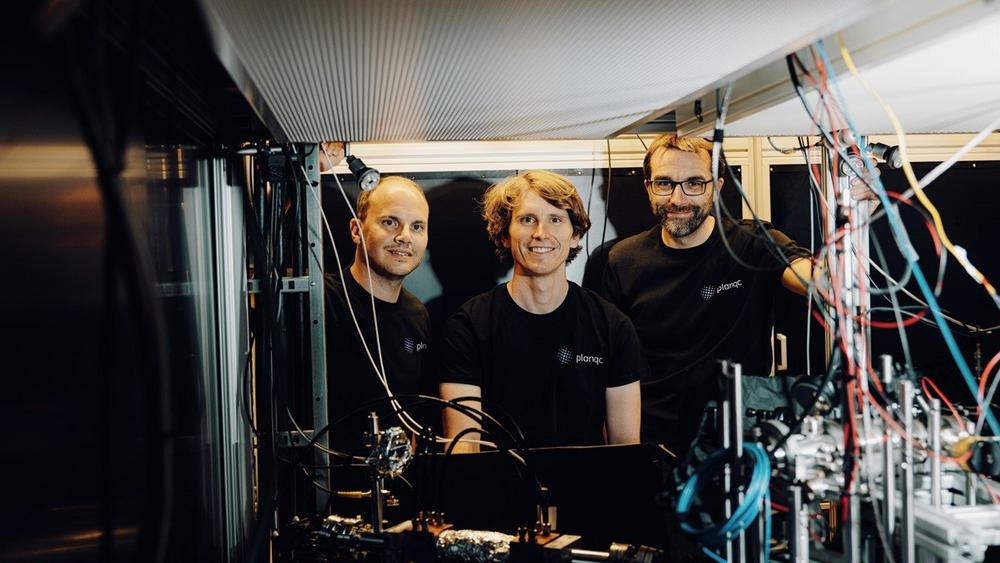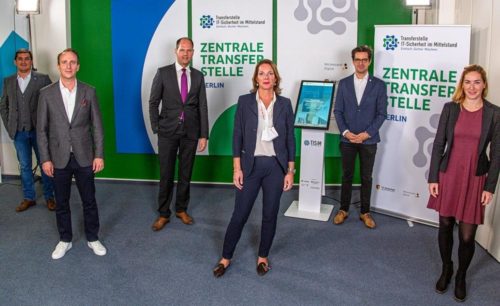
gate-Startup planqc raises 50 million Euro series A
Alexander Glätzle, CEO and co-founder of gate-startup planqc, stated, “This latest investment round is a strong endorsement of our technology as a leading platform for quantum applications. The substantial backing places us in a perfect position to take on global competitors with our ‘Made in Germany’ quantum computers, targeting an emerging market valued at billions of euros.”
planqc’s unique technology, built on award-winning research at the Max-Planck-Institute for Quantum Optics (MPQ), aims for rapid advancement in the development of industry-relevant quantum computers. The new financing will be utilized to establish a quantum computing cloud service and to develop quantum software for applications in industries such as chemistry, healthcare, climate-tech, automotive, and finance. Today, planqc is already using quantum machine learning to work on climate simulations or more efficient batteries for electric vehicles.
Dr. Sebastian Blatt, CTO of planqc, explained the core of planqc’s technology: “Unlike most other companies, including Big Tech, we use individual atoms – confined in crystals of light – as qubits. This approach is the fast track to scaling the number of qubits and improving their quality, the prerequisites for being the first to deliver fault-tolerant quantum computers.”
Founded in 2022 by scientists from MPQ and Ludwig-Maximilians-University Munich (LMU), planqc is located at gate Garching in the heart of Munich’s Quantum Valley (MQV). Recently, the company has been commissioned to deploy a 1,000-qubit quantum computer at the Leibniz Supercomputing Centre—one of the nation’s premier supercomputing facilities — by the German Government. Moreover, planqc has secured a European tender to develop a quantum computer for the German Aerospace Center (DLR).
Dr. Torsten Löffler, Investment Director at DTCF on the occasion, “We are thrilled to invest in a startup that not only leads in high-impact technology but also enables further breakthroughs in most pressing global computational challenges across various industries by offering access to the technology in form of a quantum cloud computing service. planqc’s impressive track record in securing contracts – in particular the DLR Tender – and public grants within just 18 months of operations underscores the company’s role as a frontrunner in the quantum computing sector both in Europe and globally.”
Prof. Immanuel Bloch, director at MPQ, added, “At MPQ, we have a strong tradition of supporting spin-offs from our institute and translating fundamental science to industry. planqc is the latest example and is based on our expertise in trapping, cooling and manipulating cold atoms and molecules. In the future, we look forward to extending this collaboration.”
The MPQ in collaboration with planqc already showcased the scaling of the number of neutral atoms utilized as qubits to 1,200. Reaching this industry milestone in qubit numbers paves the way for fault-tolerant – and therefore practical useful – quantum computers. Further scaling to 10.000 or even 100.000 qubits is expected in the next couple of years. These systems will then be capable of tackling previously unsolvable problems.
The computational power of quantum computers is poised to revolutionize the discovery of new materials and pharmaceuticals, address optimization challenges in fields like climate research, industry, and transportation planning, and usher in a new era of cryptography. Quantum machine learning will unlock unprecedented applications for artificial intelligence, while providing the scientific community with a wholly new understanding of the world.
Dr. Anna Christmann, Coordinator of the Federal Government for German Aerospace and Commissioner for the Digital Economy and Start-ups at the Federal Ministry for Economic Affairs and Climate Action: “The success story of planqc demonstrates that innovative research today can become the forward-looking companies of tomorrow, strengthening our long-term competitiveness. We are proud that our ongoing commitment to innovation-friendly frameworks and easier access to venture capital is bearing fruit, and we continue to work every day to improve the start-up ecosystem in Germany and Europe.”
“Neutral atoms are currently on the fast track to achieving fault-tolerant quantum computing,” adds Hermann Hauser, representing the APEX Amadeus Technology fund, one of planqc’s seed investors. “I am deeply impressed by planqc’s rapid progress in this area. Securing over 50 million euros in contracts within 18 months and achieving Europe’s first 1200-atomic qubit array are remarkable milestones for planqc and Europe’s tech sovereignty. I eagerly anticipate our continued collaboration in this pioneering field.”
“Quantum computers are one of the technologies that can offer unforeseeable added value by facilitating or even enabling the discovery, research and development of other future technologies. Examples include new medicines, sustainable battery technology and climate simulations. plancq’s technologically promising approach coupled with the existing technological maturity convinced us,” says Monika Steger, Managing Director of Bayern Kapital.
Benjamin Erhart, General Partner at UVC Partners concludes, “the rapid progress of planqc since our initial investment is rooted both in planqcs scientific excellence as well as its capability to attract world class talent. In line with our strategy of building sustainable category leaders, it was a clear decision to double down on planqc significantily.”
Das Gründerzentrum auf dem Forschungscampus in Garching bei München bietet heute rund 50 Startups Infrastruktur auf dem neuesten Stand der Technik. Die gate-Startups skalieren dank der erweiterbaren Büros in direkter Nachbarschaft zur Technischen Universität München, unterstützt von professioneller Beratung und Coaching. Gefördert vom Freistaat Bayern hat das gate seit der Gründung im Jahr 2002 bereits mehr als 300 Unternehmen zum Erfolg verholfen. Das „gate to success“ eben.
gate Garchinger Technologie- und Gründerzentrum GmbH
Lichtenbergstraße 8
85748 Garching bei München
Telefon: +49 (89) 5484-0
Telefax: +49 (89) 5484-1010
http://www.gategarching.com
Marketing & Communications
Telefon: +49 (89) 5484-1115
E-Mail: elena.peter@gategarching.com
![]()





